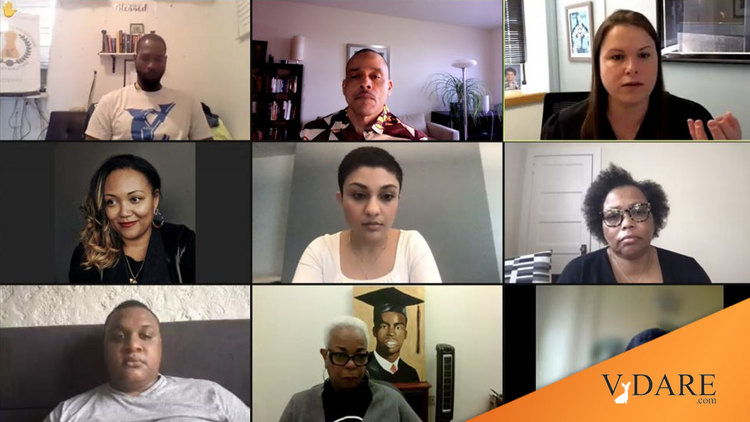


By Paul Kersey
04/04/2022
Because black people commit nearly every fatal/nonfatal shooting in Philadelphia, black journalists and trauma surgeons agree local media shouldn’t report on individual black violence because it hurts black people’s feelings.
Seriously.
Stop doing ‘breaking news’ for more accurate gun violence coverage, panel says: One solution: Build relationships to restore trust in local media, by Beatrice Forman, BillyPenn.com, April 1, 2022
Here’s something you might not expect to hear from a reporter: stop covering “breaking” news — at least when it comes to crime.
That was one of the most striking takeaways from Friday’s Shift the Narrative panel. Sponsored by the Philadelphia Association of Black Journalists, the Philadelphia Center for Gun Violence Reporting, and Firelight Media, the virtual conversation centered on a question that’s asked a lot in Philly: How can journalists cover gun violence in ways that rebuild community trust — and don’t retraumatize survivors?
Last month, West Philly and Kensington residents told Billy Penn that constant coverage of individual shootings and a climbing homicide rate not only breeds disillusionment, but also ignores grassroots anti-violence efforts.
These blindspots make sense. Eyewitness and Action News broadcast formats emerged in Philadelphia as a way to make news profitable, with an overemphasis on crime that padded network pockets but isolated Black viewers.
Moderated by PABJ President and Philadelphia magazine editor-at-large Ernest Owens, the conversation asked researchers, community leaders, and journalists to consider the limits of standard crime coverage as gun violence continues to impact households indiscriminately.
More than 500 shootings have occurred since the start of 2022, which is slightly down from last year’s record pace, but still much higher than before the pandemic. Philadelphia Police Commissioner Danielle Outlaw recently said PPD officers can’t keep up with the pace of violence.
Panelists included Philadelphia Sun reporter Denise Clay-Murray and Temple University Hospital trauma surgeon-slash-gun violence researcher Jessica Beard, alongside the founders of three local anti-violence nonprofits: Philly Truce, Mothers in Charge, and the Young Chances Foundation.
Conclusions? Journalists need to stop framing coverage around individual shootings and start forging relationships with neighborhoods that don’t center on an information transaction.
rauma surgeon and researcher Beard, whose recent research analyzed local news coverage of gun violence incidents, pointed to episodic framing as the media’s biggest obstacle.
You can think of episodic frames as the journalist’s equivalent to a season of “Law and Order: SVU,” where each individual episode focuses on solving a specific crime, with little overarching narrative.
For reporters, episodic crime coverage means focusing on each incident individually without acknowledging the context: what caused the conflict, what resources the neighborhood has, and how victims or bystanders might describe things differently than police. It’s the default format for local outlets trying to break news fast, but Beard argued that it misinforms readers and viewers.
“I don’t see a lot of value in episodic reports,” she told the panel. “If you constantly consume episodic coverage on firearm injury, [for example] you’re always going to be thinking of it as a crime problem. You won’t know what the solutions are … or what to ask of elected officials.”
How might reporters fix this? With a focus on systemic issues — and a new definition of breaking news.
“I don’t think two guys getting into an argument on the corner of 19th and Lehigh and shooting at each other is breaking news,” said longtime journalist Clay-Murray.
Across the board, panelists advocated for renewed focus on the determinants of crime, like neighborhood disinvestment, food insecurity, and lack of economic opportunity.
Don’t assume people like talking with reportersWith traditional “breaking news” coverage, conversations with reporters can easily turn transactional. The job of a reporter is to extract the information necessary for a story, which can often mean disregarding some pretty flagrant context: that someone’s child just died, a family is grieving under stress, and opening up can be stressful.
And sometimes, that information is sensationalized — meeting the needs of a newsroom, maybe, but not necessarily the needs of a community. Panelist Tyrique Glasgow, who founded the Young Chances Foundations, pointed out that showing crime footage might grab eyeballs on the news, but it could also encourage copycat acts.
“Soon, it becomes a competition to see who can become the next headline,” said Glasgow.
To erode that power imbalance, Clay-Murray and Mothers in Charge national director Dorothy Johnson-Speight offered tips for reporters on how to build relationships with communities that might be distrustful of media intentions.
For starters: Don’t assume everyone likes speaking with journalists.
“Recognize that you’re going into a situation where you have someone who may not want to talk to you and not force the issue,” said Clay-Murray, who recommended dropping notions of deadlines and editorial demands from the conversation.
Meanwhile, Johnson-Speight stressed the notion of creating enduring relationships. Reporters should coexist in these communities when good news happens — or even without any “news” at all. That breeds trust, she said, because it demonstrates a good-faith interest in marginalized communities beyond the headlines.
And sometimes, journalists might have to accept when too much damage has been done and try to rebuild a wholly new relationship, said moderator Ernest Owens.
“You can change the reporters, but not the community’s opinion of the publication.”
If Philadelphia were 100 percent white, would we see anyone advocating for the end of breaking news segments on gun violence? No. Because there would be virtually no gun violence in the city.
In a city where almost every fatal/nonfatal shooting is committed by blacks (or BIPOCs), this is what you get: black journalists begging for an end to individual news reports on black homicide and black nonfatal shootings.